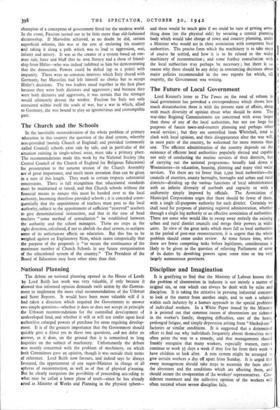The Future of Local Government
Lord Kennet's letter to The Times on the need of reform in local government has provoked a correspondence which shows how much dissatisfaction there is with the present state of affairs, along with much diversity of opinion about what should be done. The war-time Regiona) Commissioners are concerned with areas larger than those of any of the local authorities, but not too large for purposes of future town-and-country planning and perhaps other social services ; but they are controlled from Whitehall, tend to clash with local opinion, and their disappearance after the war will, in most parts of the country, be welcomed for more reasons than one. The efficient administration of the country depends on the existence of efficient local authorities popularly elected and capable not only of conducting the routine services of their districts, but of carrying out the national programmes broadly laid down at Westminster—in education, housing, planning and many vital social services. Yet there are no fewer than 1,5oo local authorities—the councils of counties, county boroughs, boroughs and urban and rural districts—dividing up the various functions of local administration with an infinite diversity of methods and capacity or with a uniformity simply imposed by officials. The Association of Municipal Corporations urges that there should be fewer of them, with a single all-purposes authority for each district. Certainly we shall need for purposes of planning regional administration, whether through a single big authority or an effective association of authorities. There are some who would like to sweep away entirely the existing urban and rural district councils and merge their powers in wider units. In view of the great tasks which must fall to local authorities in the period of post-war reconstruction, ft is urgent that the whole problem should come under review. At some future time, when there are fewer competing tasks before legislators, consideration is likely to be given to the question of relieving Parliament of some of its duties by devolving powers upon some nine or ten very largely autonomous provinces.


























 Previous page
Previous page